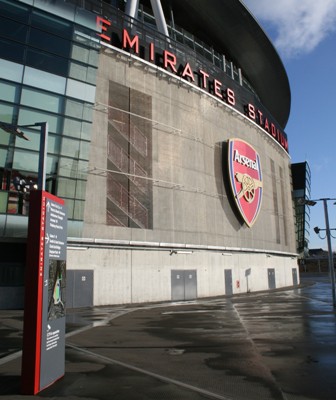The Tour de France: has found its niche and its audience

Jeff Foulser: Sunset and Vine chairman
Rights and wrongs: sport and television
Sunset and Vine are one of the biggest players in television coverage of sport. The Leisure Review spoke to Sunset and Vine chairman Jeff Foulser about the impact of television and why ratings rule the world of sport.
The Tour de France: has found its niche and its audience

Jeff Foulser: Sunset and Vine chairman
Sunset and Vine is one of the two biggest independent sports producers in the UK. Working for all the main broadcasters, the company covers the Europa League football for Channel Five, the Grand National for the BBC as part of a deal in which they also cover all of the BBC’s horse racing output, including Royal Ascot and the Derby, cricket highlights for Channel 5, the cricket world cup for the BBC and coverage of rugby union’s Aviva Premiership for ESPN. There are poker programmes. Sunset and Vine will also be covering the world athletics championships for Channel 4 and will be their producer for the 2012 Paralympics. This last one on the list is, Sunset and Vine’s chairman, Jeff Foulser, admitted, “a massive contract” and he had not mentioned the company’s coverage of the Tour de France for Channel Four and subsequently ITV4, a contract which after decades of delivery Sunset and Vine had only recently relinquished following a retendering process.
It is a track record familiar to almost anyone who has watched sport on television and this output has established Sunset and Vine among the key players of the high-stakes game that sports coverage has become. The company is, as Foulser noted, “pretty well respected as producers” and has gained a reputation for innovation. Where once it might have been a case of turning up and turning on the cameras, television is now much more focused on bringing the viewing audience closer to the action. Sunset and Vine’s coverage of Test match cricket for Channel 4 at the end of the 1990s is, Foulser suggested, a case in point.
“I think we raised the bar, not just in the case of cricket,” he said. “Other people have said to me that it made them raise the bar. We introduced things like Hawkeye, which is now used in cricket and tennis. We introduced the analyst in the truck to provide a narrative between overs. We introduced things like the Snickometer to detect an edge and the red zone [for LBW appeals]. There were lots of innovations that we brought in, lots of graphics, and it made other people in other sports think.”
The last year of Channel 4’s coverage before they lost the broadcasting rights was the 2005 Ashes series, in which England won the Ashes for the first time in 18 years. This extraordinary series of matches gripped two sporting nations over the course of a northern hemisphere summer and regularly brought eight million viewers to Channel 4 to watch the drama unfold.
“It clearly touched the viewing audiences,” Foulser said. “Sport touches people’s lives and television has a role to bring that to life. Since I’ve been in the business, which is getting on for nearly 40 years, it has always been an important part of people’s lives.”
Over the last 20 years the profile of sport on television has changed beyond recognition, serving as the battleground for a whole range of new terrestrial and satellite broadcasters all engaged in savage battles to secure sports’ broadcasting rights and the viewing figures that these sports can deliver. It is a fierce marketplace in which to operate and one that the sports themselves cannot always fully control. Foulser accepted the point. “Sometimes it’s hard,” he said, “but I think they all understand that without television they haven’t got a product. The Premiership would not exist without Sky and Sky’s money. Sky has funded British football, basically.”
Having been in charge of ITV’s football coverage in the late 1980s, Foulser was well placed to listen to the arguments from some within the game that the contract to cover 21 matches a season would be a disaster. “They were getting audiences of around eight million on a Sunday afternoon,” he recalled. “It affected gates initially but then people got used to it. Now you see 21 live matches in a week and it hasn’t affected the gates at the top end. What Sky has done for football in this country has been phenomenal.”
If television has changed sport, in the case of football beyond all recognition, has it always been a positive impact? Foulser was quick to respond: “No. It’s not always a good thing. It has made the game all about money now and I don’t think that’s a particularly good thing. In the past football and footballers were all about winning; winning the league, trying to win the World Cup. In 1966 when England won it wasn’t about money: it was about being the best. I think that has gone from football. Players are paid far too much money; everyone knows that. I don’t think they realise their responsibilities but you can’t blame television for that. Sky paid the money because they realised that without football they didn’t have a business, so it was a case of ‘how big a cheque do we need to write?’ It’s up to football what they have done with the money and I’m not the first to say that all they’ve done is pile it onto players and agents.”
Coverage of the Tour de France, and subsequently other professional cycling events, on British television provides an interesting case study of how a minor sport can find its place in the schedules and find an audience. Where once the Tour was given a half-hour slot on ITV’s World of Sport, a production on which Foulser cut his television teeth, Channel 4’s approach provided daily coverage over the three weeks of the event with a regular time slot in the schedules. As the audience built among cyclists, general sports fans and people who liked to see France en fête, the daily package, provided by Sunset and Vine and moved to ITV4 , was expanded to an hour. As the number of British riders has grown so has the audience.
“It found a niche [in the schedules],” Foulser said. “Channel 4 took it over and raised the profile. It’s now on ITV4 and the audience finds it. It delivers good ratings for them and there is strong support. The TV coverage made heroes of Chris Hoy and Bradley Wiggins, Cavendish and Boardman. Without TV they’d have been reasonably well known but now they get asked for autographs.”
Coverage of professional cycling has expanded on the back of the success of the Tour de France programming. ITV now include other professional road events, including the upcoming Tour of Britain, in their schedules and the BBC has given extensive air time to the world track championships, riding the wave of the phenomenal success engineered by David Brailsford at British Cycling. However, while cycling might serve as a model for other sports trying to get exposure, Foulser explained that getting coverage can be difficult.
“For a start, they hope to get on,” he said. “If you talk to people at the BBC, they are inundated by the smaller sports – badminton, squash, hockey, very good minority sports – who are desperate to get on TV, which brings exposure and helps to attract sponsors but there’s only so much air time. Most of the minor sports are on the satellite channels, which have smaller audiences, but they still need to get on there.
“We’re going to be covering the Americas Cup and that’s a brand of sailing that is going to be revitalised, reinvented if you like, by some guys who were behind the success of the Champions League. They are charged with raising the profile of the Americas Cup again and television will play the major part in that. Any sport that hasn’t got the backing of television will struggle. I was a squash player and I love it but if we’re being honest it’s not a great game to watch. They are trying really hard to raise the profile of their sport but television is not really interested.”
Foulser admits that there is a temptation for some sports to change their game to fit the demands of television. Twenty20 cricket is just one example. “It’s sad for someone of my age and background,” he said. “I’m a fan of Test cricket. It’s the ultimate form of the game, the ultimate test, but Twenty20 is a bite-sized version of the game. It’s like going to a lovely restaurant, having a starter and being told you’ve got to go. I get it, because it fills a role and it’s been a success, but it’s been developed for television and for people with a short attention span to get them interested in the game. Rugby sevens is the same; it’s not the real thing but it is exciting and it’s good for TV. It will be fantastic at the Olympics.”
The days when the television producer’s job was just to turn up and point the camera are, Foulser agreed, long gone. Sunset and Vine work very closely with the governing bodies and the clubs to find out what they want to achieve but, as producers of television programming for broadcasters, they are very clear that their customers are in the business of achieving ratings. “So whatever we do, however we produce our shows, its designed to make them appealing to as many people as possible. To do that you need to have the [sports’] authorities and the clubs working with you.”
The Aviva Premiership have responded positively to a fresh approach to rugby coverage in which room has been found for some light-hearted moments. The ESPN mobile studio has apparently been popular with viewers and those performing for the cameras. Even cricket’s notoriously reactionary authorities have softened over the years, allowing cameras to track the long walk from dressing room to boundary.
“At the outset of our cricket coverage the MCC said we couldn’t go into the Long Room,” Foulser said. “I’m a MCC member so know what it’s like. After we’d done one season and there had been lot of positive press they said we could do a walk through the Long Room. We followed players from dressing room to the pitch. They trusted us by then and we treated it with the respect it deserves.
“It’s a two-way thing. They know that the more we can promote their sport the better it is for them. The most important thing is the game. We’re there as sensible, creative observers to portray the event in the best light to the audience at home. That’s our role. We’re not that important. The most important are the people playing, riding, rowing or whatever they’re doing. It’s up to us to bring out their strengths, their characters, their personalities.”
The Leisure Review, May 2011
© Copyright of all material on this site is retained by The Leisure Review or the individual contributors where stated. Contact The Leisure Review for details.
Download a pdf version of this article for printing
